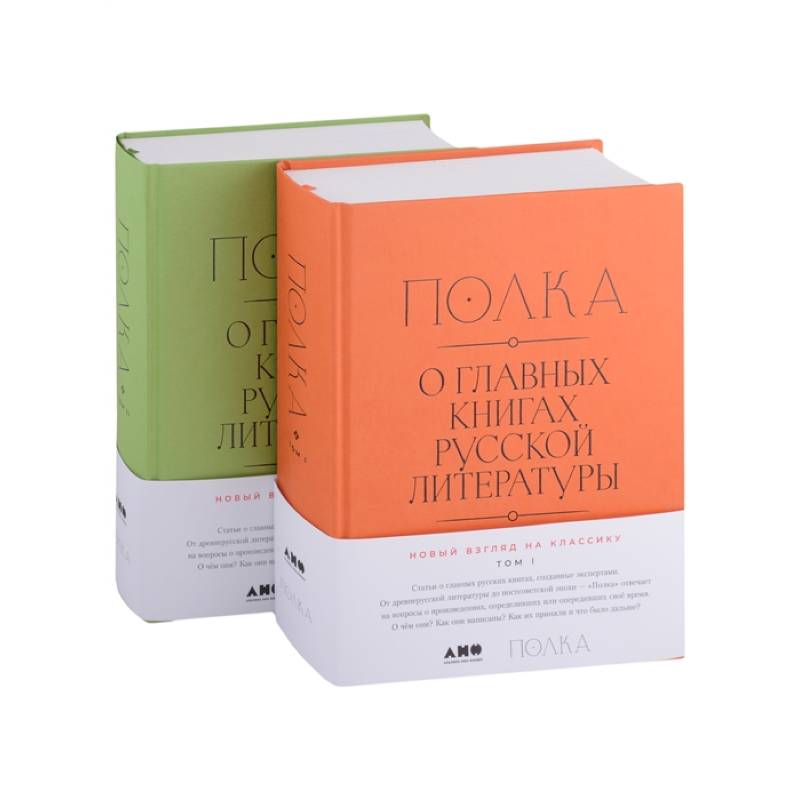Shelf. About the main books of Russian literature. In two volumes (set of 2 books)
Please sign in so that we can notify you about a reply
60 articles on the most important works of Russian literature included in the Russian literary canon.
Authors - authoritative philologists, literary critics, writers, culturalists, linguists - clearly and accessiblely answer questions about books that could have arisen among readers - relying on scientific and critical literature.
This book includes articles written and collected in the framework of the “Regiment” project. Created in 2017, the project set its goal to determine the most important works of Russian literature. For this, the large community of experts formed a list of 108 works that left a mark in history, expanded the possibilities of literature, influenced the development of language, thoughts and society, reported something new about the world and man and entered the Russian literary canon. These are novels, novels, stories, plays, poems, literary memoirs - from “Words about Igor’s Regiment” to the novel “Chapaev and Emptiness”. The authors tried to write about each of these works clearly and accessiblely, relying on vast scientific and critical literature, put each in a large literary context and tell about other texts that influenced it and which it affected.
The first two volumes of this publication included 60 articles - about Russian literature from the time of ancient Rus" until 1917
Quotes
“Are all happy families really happy the same?
To answer this question, divine omniscience is required, another is interesting: the rule formulated by Tolstoy in the first phrase of the novel was applicable to a variety of areas of life. The “principle of Anna Karenina” in the rude form can be formulated as follows: the system can be successful in the coincidence of several factors, the absence of any of them condemns it to failure. All successful systems of the same class are similar to each other, and the victims can differ in many signs. The “principle of Anna Karenina” explains the most diverse processes - from shocks in financial markets to the adaptation of biological organisms to changing conditions. Probably, he explains family happiness - if you understand it as a simultaneous coincidence of all the factors necessary for happiness (readers can call them themselves) ”
Authors - authoritative philologists, literary critics, writers, culturalists, linguists - clearly and accessiblely answer questions about books that could have arisen among readers - relying on scientific and critical literature.
This book includes articles written and collected in the framework of the “Regiment” project. Created in 2017, the project set its goal to determine the most important works of Russian literature. For this, the large community of experts formed a list of 108 works that left a mark in history, expanded the possibilities of literature, influenced the development of language, thoughts and society, reported something new about the world and man and entered the Russian literary canon. These are novels, novels, stories, plays, poems, literary memoirs - from “Words about Igor’s Regiment” to the novel “Chapaev and Emptiness”. The authors tried to write about each of these works clearly and accessiblely, relying on vast scientific and critical literature, put each in a large literary context and tell about other texts that influenced it and which it affected.
The first two volumes of this publication included 60 articles - about Russian literature from the time of ancient Rus" until 1917
Quotes
“Are all happy families really happy the same?
To answer this question, divine omniscience is required, another is interesting: the rule formulated by Tolstoy in the first phrase of the novel was applicable to a variety of areas of life. The “principle of Anna Karenina” in the rude form can be formulated as follows: the system can be successful in the coincidence of several factors, the absence of any of them condemns it to failure. All successful systems of the same class are similar to each other, and the victims can differ in many signs. The “principle of Anna Karenina” explains the most diverse processes - from shocks in financial markets to the adaptation of biological organisms to changing conditions. Probably, he explains family happiness - if you understand it as a simultaneous coincidence of all the factors necessary for happiness (readers can call them themselves) ”
Author:
Author:Бабицкая В., Гендлина Юлия Борисовна, Велижев Михаил
Cover:
Cover:Hard
Category:
- Category:Arts & Photography
- Category:Politics & Social Science
- Category:Reference books
- Category:Esoteric, Folklore & Myth
Publication language:
Publication Language:Russian
Age restrictions:
Age restrictions:16+
ISBN:
ISBN:978-5-00139-076-3
No reviews found
